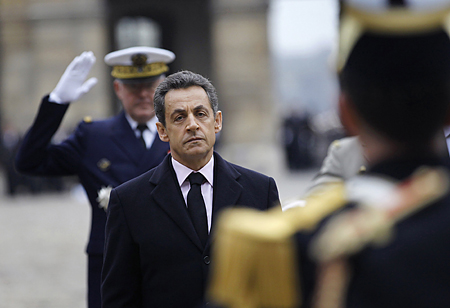
France's President Nicolas Sarkozy listens to the national anthem as he attends the traditional autumn military review at the Hotel des Invalides in Paris, November 28, 2011. (Photo: Christophe Ena / Reuters)
Indeed, the debate over foreigners voting in France or elsewhere in Europe isn’t as cut-and-dried—or even as new—as it might seem. Citizens of EU countries living in other member nations already have the right to vote in local elections and European parliamentary contests. In fact, the habit of seeing non-French nationals routinely voting may be one reason why a majority of French citizens see nothing to fear in that right being extended to legal immigrants from non-EU countries as well. And in some ways, the French may now view themselves as actually a bit behind their European neighbors in allowing foreigners to vote. Belgium grants voting rights to non-EU nationals after five years of legal residency, and Britain allows residents of all Commonwealth nations in good standing to participate in local UK elections. Spain, meanwhile, extends the right to vote to documented aliens from non-EU countries whose capitals reciprocate that entitlement to legal Spanish residents.
Despite that European trend—and the new momentum its gaining in France—why is Sarkozy opposing the proposal he backed before capturing the Elysée? Political calculation, most analysts say. Over the past two years—with his approval ratings tanking, and re-election chances looking gloomy—Sarkozy has sought to reproduce his 2007 electoral coup of wooing extreme-right voters to his cause by again adopting controversial positions catering to hard-right conservatives. That includes the rounding up and deportation of foreign Roma as part of his “war” on crime, passing a law banning the burqa being worn in public, holding a national debate on French identity that detractors claimed stigmatized foreigners and minorities, and repeatedly casting illegal immigration as the cause of some of France’s more acute problems. But though the seduction of far right voters to his mainstream conservative base was a resounding success in 2007, observers now say it’ll be a tough trick to pull off again in 2012—especially regarding the issue of voting rights for foreigners.
First off, some analysts note that, this time around, extreme-right leader Marine Le Pen has not only won back people who defected from her father’s 2007 campaign to join Sarkozy, but has also enlisted many mainstream conservative (and Sarkozy) voters who find her more moderate-sounding message more legitimate those Jean-Marie Le Pen delivered. Secondly, with the new poll finding 43% of conservatives backing the right to vote for non-EU foreigners, the issue is one of a few Sarkozy could lose mainstream right-wingers to by playing his hand with the extreme-right in mind.
“This proposition strikes me as dangerous…because it risks deeply dividing the French people at the time we must unite them,” Sarkozy said during a Nov. 23 speech, in which he even sounded somewhat tepid about European treaties that grant legal EU residents in France the vote in local contests. “I am very attached to the idea that the constitutions shouldn’t go beyond that, because the right to vote and to run for election must remain rights dependent on French nationality, (and) extended for municipal and European elections to European citizens who share a common destiny with us.”
To be sure, the foreigner voting issue isn’t one that will determine the outcome of France’s presidential and legislative elections next April and May on its own—and it’s doubtful that issues of immigration and multiculturalism will trump more pressing concerns of the debt crisis, the economy, and unemployment. Yet the unexpected public support of alien voting rights is another sign of how many of the electoral swords Sarkozy has brandished cut both ways—and could yet be turned against him as his looming re-election bid approaches.

